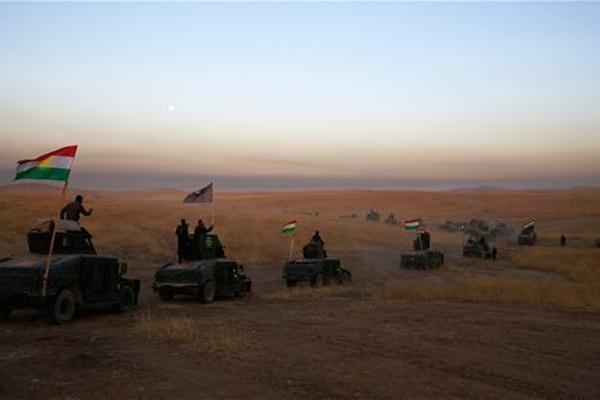Iraq forces launch battle to liberate Mosul from ISIL
BAGHDAD - Agence France-Presse


AP photo
Iraqi forces have launched a campaign to retake Mosul, the self-declared capital of the Islamic State of Iraq and the Levant (ISIL), the prime minister said on Oct. 17 in what the US hailed as a "decisive moment" in the battle to crush the jihadist group.Up to 1.5 million civilians remain in the city, the United Nations said, voicing fears the vastly outnumbered Islamists could use them as human shields as they seek to repel the assault on its last major stronghold in the country.
"Today I declare the start of these victorious operations to free you from the violence and terrorism of Daesh," Iraqi Prime Minister Haider al-Abadi said in a televised address, using an alternative name for the ISIL group.
Mosul fell to ISIL militants two years ago as they marched through Iraq and Syria, where the civil war left a power vacuum that they easily exploited.
Its recapture would shatter the group's claim to be running a "caliphate" and would all but end its presence in Iraq as a land-holding force.
That claim received another body blow on on Oct. 16 when Turkey-backed Syrian rebels retook the town of Dabiq from the group.
The anti-ISIL alliance -- including the US-led coalition, Kurdish Peshmerga and Iraqi government forces -- has recently been tightening the noose around Mosul, and the assault has long been predicted.
But they will have to fight their way through ISIL defences to reach the city. Some groups are still dozens of kilometres (miles) from Mosul.
When they get there, the fighting is expected to be fierce.
UN deputy Secretary General for Humanitarian Affairs and Emergency Relief Stephen O'Brien said civilians in the city were in real danger.
"I am extremely concerned for the safety of up to 1.5 million people living in Mosul who may be impacted by military operations to retake the city from ISIL," he said.
"Depending on the intensity and scope of the fighting, as many as one million people may be forced to flee their homes in a worst-case scenario," O'Brien said in a statement.
Children and elderly are among those at greatest risk.
"Tens of thousands of Iraqi girls, boys, women and men may be under siege or held as human shields. Thousands may be forcibly expelled or trapped between the fighting lines," O'Brien added.
In the two years since ISIL leader Abu Bakr al-Baghdadi proclaimed a "caliphate" straddling Iraq and Syria, Iraqi forces, with the support of Iran and a US-led coalition, have battled to win back lost territory.
Prime Minister Abadi on Oct. 17 vowed that only government forces will enter Mosul, a Sunni-majority city that ISIL seized with relative ease partly due to local resentment towards the Shiite-dominated security forces.
Shiite militia groups have been accused of serious abuses against Sunni civilians in the course of operations to reconquer territory from ISIL.
"The force leading liberation operations is the brave Iraqi army with the national police and they are the ones that will enter Mosul, not others," Abadi said.
He did not divulge details of the latest movements on the ground.
"This is a decisive moment in the campaign to deliver ISIL a lasting defeat," US Secretary of Defense Ash Carter said.
"We are confident our Iraqi partners will prevail against our common enemy and free Mosul and the rest of Iraq from ISIL's hatred and brutality."
Baghdad is also keen to check the influence of the autonomous Kurdish region, which significantly expanded the territory it controls on the back of the 2014 jihadist assault.
A clear victory would go some way towards restoring the confidence and credibility of the security forces, which collapsed when ISIL attacked, abandoning huge amounts of US military equipment to the group in the process.
But even the recapture of Mosul will not mark the end of the war against ISIL, which still holds other territory in Iraq and is likely to turn increasingly to insurgent tactics such as bombings and hit-and-run attacks as it loses more ground.
The jihadists are thought to number between 3,000 and 4,500, against an estimated government force of around 30,000.
The battleground is vast and the area's ethnic and religious diversity makes it politically complex.
ISIL has attempted to erase the ancient city's history, forcing Christians and other minorities to flee and destroying priceless heritage.
